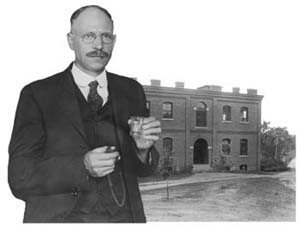 |
 |
| current issue |  | past issues |  | send a letter/news |  | address update |  | advertise |  | about us |  | alumni home |
Web Extras
|
The Life and Work of Charles James
A professor emeritus of history writes about her father, a UNH professor and prominent chemist. By Marion James '40 |
Easy to print version Make a comment |
One hundred years ago, Charles James arrived at New Hampshire College to teach chemistry and begin a distinguished career.
 Charles James |
Early Years
Charles James was born in England on April 27, 1880. His father died when he was 6, and he was brought up by his mother, Mary Diana Shatford-James, in Holly House in the small village of Broughton, Northamptonshire. He was educated first by a governess and later at a school in the neighboring town of Wellinborough, where he took the program run by Cambridge University. He said he was introduced to chemistry through reading his father's books on the subject. He also may have taken a chemistry course at school.
Becoming fascinated with the field, he set up a laboratory at home at age 15 for his own experiments. A friend of his later remembered seeing him making bombs to blow up decaying tree stumps in the area. ¹
Around the same time, his studies encouraged him to establish connections to the scientific world. He collected the names and addresses of great English chemists, and wrote to Sir William Crookes and Sir William Ramsey, the latter about to win the Noble Prize and who "was considered the greatest chemist of his time." ² Both men replied, and he and Ramsey continued to correspond. "Charlie" besieged him with scientific questions. Impressed, Ramsey invited him to visit his laboratory.
When James graduated from school in Wellingborough, his mother persuaded him to take a job with a business firm in Northampton. He was not a dedicated employee—he constantly demanded to be allowed to study chemistry with Ramsey at the University of London. In those days, around 1900, the programs of Oxford and Cambridge did not see fit to include chemistry. Mrs. Shatford-James did not approve of her son's choice. Chemistry was not considered a noble profession. To her, a chemist was a dispenser of drugs in an apothecary shop. But one suspects that Charlie was irritatingly persistent. In the meantime, his older brother, William, became a gentleman farmer and bought the very large estate of Pytchley Grange. Charlie set up a laboratory there. But William, living beyond his means, lost the property.
Finally, his mother gave in. Arriving in 1899, he studied constantly with Ramsey, who was James' close friend and mentor to the end of his life. In his second year, James won the Ramsey silver medal. Along with his studies, he obtained considerable industrial experience. In 1904, he passed the examinations for associate in the Institute of Chemistry. And in 1907 he earned the rank of fellow after another set of examinations. By that time, he had decided that his life would center on the study of the rare earths.
After receiving his associate's degree, he informed Ramsey that he was planning to go to Egypt. Ramsey, thinking this was not the best start in life for his prize student, tried to steer him in a more rewarding direction. Suddenly, in 1906, James received an offer of a position with the National Refining Company at West Chester, New York, which he accepted. In 1906, he found himself in America.
 James Hall |
Arrival at New Hampshire College
Soon after his arrival in the United States, James mysteriously received an offer of a position as an assistant professor in chemistry at the New Hampshire College of Agriculture and Mechanic Arts in Durham, N.H. The college had been in Durham for only 13 years, housed in a handful of buildings, including T-Hall, Conant Hall, Hewitt Hall and Morrill Hall. There were 26 faculty members and 26 students graduating that year.
Although the college was a fledgling institution, it had one unusual feature that appealed to Charles James. When the college was established in Hanover, N.H., in 1866, it started with one faculty member, a chemist named Ezekiel Dimond. He became instrumental in the development of the whole institution, taking on many administrative tasks. As a chemist, he created the only department in the college, the chemistry department. After his death in 1876, other chemists took over. When New Hampshire College was moved to Durham in 1893, there was still only that one department—chemistry, located in Conant Hall. One important member was Charles Parsons, a distinguished chemist in his own right, who had just made the offer to James. An academic career in an institution and a department that were just taking shape, where he might participate in the making of policy, and where there was the opportunity to develop his own laboratory and research interests, was persuasive. James accepted the job. But he was an adventurer at heart anyway.
Easy to print version
blog comments powered by Disqus

